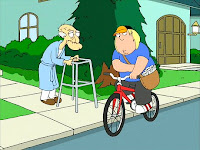
All of my son Andrew's friends seem to have ipod Touches; it is obviously the hot device to own right now. This morning over breakfast one of his friend's younger brother, Cooper, was sharing an app that his mother had downloaded for him. I was expecting to see an amusing game, or perhaps a whimsical application featuring a gun or a cigarette lighter. Instead, I was treated to something I wasn't quite expecting. What the boy had on his ipod was an application that allows the user to search the online sex offender registry. Andrew and his friend Otis are both 12-years old, but Cooper is only 7, albeit a very mature 7-year old.
What followed would have been funny if not for the fact that I was looking at mug shots of these wretched individuals in the company of three children. Cooper would pull one of them up, and the boys would then comment on the gory details. I was put into the rather awkward position of serving as translator in which capacity I helpfully explained what "sex batt" stood for, as well as some other charming abbreviations. Interestingly enough, what they found the most fascinating of all was the fact that most of these men were ancient. One of them was born in 1930 and once the boys had done the math in their heads the fastest screamed "For Christ's sake, he's 80-years old!", or words to that effect.
As uncomfortable as I felt, maybe this isn't an altogether bad thing. These kids are far more saavy then I was at their age. I doubt that one of them would fall for a pedophile asking them "Can you help me look for my lost dog?". That is not to say that they are absolutely immune to being preyed upon, only that it would take a much more sophisticated, or threatening, approach on the part of the predator.









